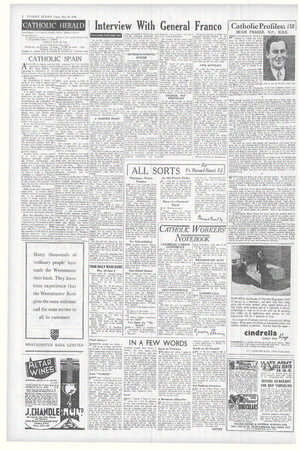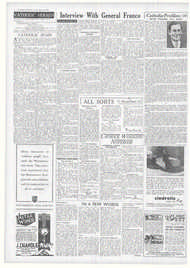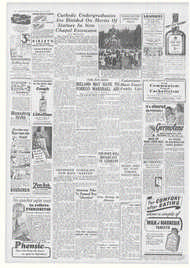Page 4, 28th May 1948
Page 4

Report an error
Noticed an error on this page?If you've noticed an error in this article please click here to report it.
Tags
Share
Related articles
General Franco Warns
Exaggerated Figures In British Press
Interference In Spain
Inside Spain They Say . .
Rumours Of Internal
Interview With General Franco
Continued:: from page one-,
By an odd chance I overheard next day in the train to the Escorial a number of Spaniards discussing diplomatic ways during the war. They cited British diplomacy, French. American, German, Italian and Russian. But the best, one of them said, was Galician diplomacy. Franco is a native of Galicia. This consists of ' getting your own way by delicate flattery. Mussolini was not taken in by Franco, they said, but Hitler was completely foxed by Franco's declarations of friendship. It was a curious, but most effective confirmation of what the Caudillo had said to me the day before.
To return to the interview. The General by this time had warmed up to the theme, and he asked me to explain to him how it was that Denmark, Sweden, Switzerland and Turkey had all had cloie relations with Germany during the war, and yet were honoured names to-day
And he brought out one of his most mischievous smiles as he asked me further to explain how Soviet Russia's freely taken resolution to fight on Germany's side, as long as Germany allowed her, squared with the Allies' idolisation of that Power until quite recently ?
Somehow I felt that the further awkward questions I had up my sleeve were not going to make the impression I had hoped for.
A SHREWD POINT
We passed on, and the General made the shrewd point that Britain and America were now opposed to Russia, but for a very different reason to Spain's opposition to Russia.
Britain and America, he suggested, feared, not Communism, but the thredt of Soviet Power against Western Europe. Spain opposed Communism for what Communism was and is, quite irrespective of political • balances of power. This was the real explanation of the Spanish regime. The General told me that he had not the slightest doubt that in a free election to-day he would be easily returned to power. (He was saving me the trouble of asking him why he did not simplify matters by having an election.) " I do not intend to hold such an election at present." he said, " simply because It would open the door into which Communism could drive its first wedge.
" Given the nature of Communism and the way it takes unscrupulous advantage of free institutions, it is wise to hold the door tightly shut. Great satisfaction," ho went on, " has been expressed at the Christian-Democrat victory in Italy. But I cannot forget that the Spanish Accion Popular (C.E.D.A.) had won a similar General Election three years before the Conununist aggression against Spain was launched. I am not very impressed by the Italian victory."
The Caudillo might be right or he might be wrong, I was thinking, but he certainly bad plenty to say for himself.
With some difficulty I managed to find an opening to put the basic democratic objection to all totalitarianism and authoritarianism, however apparently good. I quoted Lord Acton s dictum that all power corrupts and absolute power corrupts absolutely.
As courteously as i could I tried to suggest that no regime was proof against this danger. If the worst happened, what could the people do but revolt, probably in a bloody fight.
But this did not disconcert him. He succeeded in conveying the suggestion that I could not be proposing this difficulty in reference to Spain, 'since the major premiss did not apply.
Surely I was not suggesting that Spain was totalitarian 1 But in case I might be so foolish. General Franco poured forth a list of guar
antees of essential liberty. that the Spanish possessed, explained the actual way in which the Government worked, and treated me to an account of the evolution towards a " third system," neither absolute, nor democratic in the Anglo-Saxon sense, which was all the time being made.
" REPRESENTATIONAL " SYSTEM
This was when I should have bad a command of shorthand instead of being confined to making violent mental efforts to remember the gist of what he was saying, However it was along these lines.
Spain is working as fast as internal and external circumstances allow towards a representational system based on function and the concrete criticism of, and co-operation in, actual policy and measures instead of being content with heads and parties.
(The General with Spanish courtesy, spoke well of Britain while /0/ pretending he had at present kindly feelings towards British policy, but it was clear that he knew quite a lot about to pod about how things arc shaping politically in Britain to-day. Those who imagine that he is ill-informed are much mistaken.) He pointed out that the Cortes by a system of indirect election, e.g., of trade unions and professional bodies, already gives valuable and constructive co-operation to the executive. The "Fuero" or "Right" of the Spaniards protects fundamental liberties. Recalling the Referendum for the monarchy, he said that he would never dream of making it fundamental decision like that without consulting the views of the people.
From other very authoritative sources I learnt that General Franco is utterly sincere and serious in his intention of bringing the King back to Spain. He personally had nothing to gain and something to lose. by declaring the country a monarchy, since a monarchy, restored by Franco is not popular with the professional monarchists and any monarchy is not popular with some of the leading Falangists.
The General did not believe that voting by head was the most intelligent form of representation, but rather an organic system within which the people co-operated in virtue of their functions, what they really knew, e.g., in terms of their family, their trades, their professions, their authority. Such was the type of " third system " to which the new order must evolve and was evolving.
In the course of some not too difficult criticism of universal Suffrage on the basis of its record in the Continent, he asked me whether the Yalta and Teheran conferences which decided so much of the subsequent fate of many peoples had been democratic ?
Referring again to the danger of Communism he mentioned the Communist attempt to use the coloured races. and expressed the hope that strictly democratic means would not be used to meet this growing danger. It would not work.
SOLDIER, NOT POLITICIAN
At this point it might be well if I quoted the remark of perhaps the best and wisest political brain in Spain to-day. This person, whose name I cannot mention, observed that General Franco was a soldier, not a politician. There were considerable advantages in this, for example, the absolute certainty that the General does not relish political power, and would willingly give it up the day it is safe for Spain and for him to do so. But the position has its compensating disadvantages.
The General thinks primarily as a soldier, and there is no reason for his greatest admirers to suppose that his political views are the wisest possible. He probably fails to appreciate the circumstances in which democracy can work and underestimates the dangers of even the milder and most benevolent types of authoritarianism. He is probably too reluctant to take the risks that attend political life, but would be out of place on the battlefield.
All this is arguable, as indeed was General Franco's defence of the political evolution he envisages. But what remains crystal clear is the utter absurdity of thinking of General Franco as just another political dictator, whether of the Stalin, Hitler, Mussolini or ,South American political adventurer type. Right or wrong, he is an utterly different type of person, and 1 make no mention of his religion and the Catholicity of Spain, points on which we did not even touch: TWO APPPEALS
We ended the lbng conversation by two appeals. The General appealed for tolerance. " There is much that is done in England which we Spaniards do not like," he said, " but we do not dream of asking England to conform to our Spanish tastes. May we then not expect a like British and American tolerance for the things in Spain of Which you may disapprove, but which suit us ? The essential thing -to-day is surely co-operation for common ideals and for defence against common dangers."
Throughout the interview, he made it plain that he found the attitude of the Powers to Spain incomprehensible, and he was forced to see it as the result of Communist and Masonic pressure tamely subnutted to by the great Powers.
As we rose, I was bold enough to cap that appeal by asking the General to persuade his countrymen to take more trouble to explain Spain intelligently to the rest of the world. Some of us could do with a little Spanish Christian constructive propaganda to couriterbalance the floods of Communist and secularist propaganda. The General smiled very kindly as we shook hands. He shook hands warmly with my hard-worked interpreter. I rushed back to a large plate of ham and eggs and 1 can only hope that the ruler of Spain who remains foodless from 10 a.m. until 5.30 p.m. in order to be courteous to his visitors, humble as well as great, was equally well rewarded.
blog comments powered by Disqus







